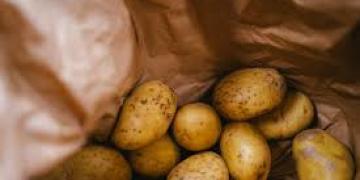Europa: Potato protein: A rising star in the plant-based protein revolution
As of 2023, the global plant-based protein industry continues to experience significant growth and expansion, driven by various factors such as increasing health consciousness, environmental concerns, and ethical considerations.

Consumers are seeking nutritious, sustainable, and ethically-produced food options, leading to a surge in demand for plant-based proteins.
The industry has seen rapid innovation, with a diverse range of high-quality meat and dairy alternatives emerging that closely mimic the taste, texture, and nutritional profile of their animal-based counterparts. This innovation has made plant-based options more appealing to a wider audience, including flexitarians who wish to reduce their animal product consumption without entirely eliminating them from their diets.
As the plant protein market continues to evolve, it is expanding beyond traditional categories like meat and dairy substitutes to include seafood alternatives, egg replacements, and plant-based functional ingredients like proteins and fibers.
This market expansion is further supported by significant investments and partnerships between start-ups, established food and beverage companies, and ingredient suppliers, fueling the research, development, and commercialization of new plant-based products.
The growing awareness of the environmental, health, and ethical benefits of plant proteins ensures that the industry will maintain its upward trajectory, with new players and innovative products continually entering the market to meet the diverse needs and preferences of consumers.
Potato protein: A potential game-changer?
Potato protein, derived from the humble potato, has in recent years emerged as a potential game-changer in the plant protein industry. As the demand for plant-based protein sources continues to grow, potato protein is attracting considerable attention for its unique properties, sustainability, and versatility.
Nutritional and functional properties: Potato protein is considered a high-quality protein source due to its well-balanced amino acid profile, containing all essential amino acids. It has a Protein Digestibility-Corrected Amino Acid Score (PDCAAS) of 0.92-1.00, comparable to other high-quality plant proteins like soy and pea.
Furthermore, potato protein demonstrates excellent functional properties such as solubility, emulsification, foaming, and gelation, making it an ideal ingredient for various food applications like meat alternatives, dairy alternatives, beverages, baked goods, and sports nutrition products.
Hypoallergenicity: One significant advantage of potato protein is its hypoallergenic nature. Unlike common plant protein sources such as soy, wheat, and nuts, which can cause allergic reactions in some individuals, potato protein is considered safe for consumption by a vast majority of people, including those with food allergies or intolerances.
Sustainability: Potato protein is a byproduct of the potato starch industry, which means its production utilizes a resource that would otherwise go to waste. This reduces food waste and makes potato protein an environmentally friendly option.
Market potential and trends: The global plant protein market is projected to grow at a significant rate, driven by factors such as increasing health consciousness, environmental concerns, and ethical considerations. Within this context, potato protein is gaining momentum as a popular alternative to traditional plant protein sources.
Major food and beverage companies, as well as start-ups, are beginning to invest in research and development of potato protein-based products. This trend is expected to continue, with potato protein anticipated to play an increasingly important role in the plant protein industry.
Notable companies operating in the potato protein industry
While the potato protein industry is still emerging and not as established as other plant-based protein sources like soy or pea, several companies have begun to explore and develop potato protein-based products. Here are a few notable players:
Avebe, a Dutch cooperative, is a leading producer of potato protein. Their product, Solanic® potato protein, is extracted from non-GMO potatoes and is widely used in various food applications such as meat alternatives, dairy alternatives, sports nutrition, and bakery products.
Branston, a major player in the UK potato industry, recently partnered with new technology provider Root Extracts to develop a potato plant protein for use in vegan and vegetarian food.
Tereos, a French company, produces Peptigel® PP, a potato protein isolate that is particularly suitable for sports nutrition, nutritional supplements, and dietetic foods. Peptigel® PP is also used in vegan food formulations, owing to its excellent functional properties and hypoallergenic nature.
KMC, a Danish company, produces Protamylasse™, a potato protein product derived from potato juice. Protamylasse™ is used in various applications, including animal feed and as a functional ingredient in food products.
Roquette, a French company specializing in plant-based ingredients, produces a potato protein isolate for use in various food applications. Roquette’s potato protein products are known for their high nutritional quality and excellent functional properties, making them ideal for use in meat and dairy alternatives, sports nutrition, and other food applications.
AKV Langholt, a Danish company, produces a potato protein concentrate called Potein™. This product is used in various applications, including animal feed and as a functional ingredient in food products.
Loryma, a German company, specializes in wheat-based ingredients. While they don’t produce potato protein specifically, they have developed a potato-based texturizer called Lory® Tex. This product is used in various food applications, including vegan and vegetarian meat alternatives, providing texture and improved mouthfeel.
Emsland Group, a German company, produces a range of potato-based ingredients, including starches, fibers, and flakes. Although their primary focus is not on potato protein, their portfolio of potato-derived products positions them as a potential player in the potato protein market should they decide to expand in that direction.
Cargill, a global food and agriculture company, offers a wide range of plant-based protein options, including pea and soy proteins. They also produce potato-based ingredients such as starches and fibers. While they do not currently have a dedicated potato protein product, their presence in the plant-based protein industry and experience with potato-derived ingredients could allow them to venture into the potato protein sector in the future.
Ingredion, a global ingredients solutions company, produces a range of potato-based ingredients, including starches and specialty fibers. While potato protein is not currently a primary focus for Ingredion, their expertise in potato-derived ingredients and growing interest in plant-based proteins may lead them to explore potato protein production and applications.
Südstärke, a German company, produces potato starch and potato-based derivatives. Although they do not currently produce potato protein, their experience and knowledge in potato processing might enable them to venture into the potato protein market as demand for this sustainable protein source continues to grow.
Manitoba Starch Products, a Canadian company, produces potato protein isolate under their ProTerra™ line. This product is designed for various food applications, including meat and dairy alternatives, bakery products, and sports nutrition.
PPZ Niechlow, a Polish potato processing company, offers potato protein concentrates for use in various food applications, such as animal feed, meat and dairy alternatives, and bakery products. Their potato protein products are known for their high nutritional value and excellent functional properties.
Israeli-based company PoLoPo have developed a technology capable of producing egg protein (ovalbumin) in potatoes.
Keep in mind that the potato protein industry is still emerging, and new players may enter the market as the demand for this sustainable, hypoallergenic protein source increases.
Challenges
The potato protein industry, while having significant potential, faces challenges that need to be addressed to ensure its growth and wider acceptance. Here’s a closer look at these challenges:
Availability: Potato protein is extracted from the byproducts of the potato starch industry, which means that its availability is directly linked to the production of potato starch. This dependency can limit the supply of raw materials required for large-scale production of potato protein.
Additionally, as the industry is still relatively niche compared to other plant-based protein sources, there may be less investment in research and infrastructure dedicated to potato protein production, affecting its overall availability.
Cost of production: Producing potato protein can be more expensive than other plant-based protein sources due to the need for specialized extraction processes and equipment. The cost factor can be a barrier for smaller companies looking to enter the market or for those wishing to produce potato protein-based products at a competitive price.
As demand for potato protein grows, it will be crucial to develop more efficient and cost-effective production methods to make it more accessible and affordable for consumers and manufacturers alike.
Taste and texture: One challenge for the potato protein industry is that the mild taste and texture of potato protein may not be as appealing to some consumers as other plant-based protein sources. This can limit the widespread adoption of potato protein in certain food applications, such as meat and dairy alternatives, where taste and texture play a crucial role in consumer acceptance.
To address this issue, further innovation in product development is needed to improve the sensory properties of potato protein-based products, such as through the incorporation of flavorings, texturizers, and other functional ingredients.
Consumer awareness: Another challenge for the potato protein industry is raising consumer awareness of the benefits of potato protein. Compared to more established plant-based protein sources like soy and pea, potato protein is relatively unknown to many consumers. This lack of awareness can hinder the growth of the potato protein market.
To overcome this challenge, the industry will need to invest in marketing and educational campaigns to inform consumers about the nutritional, functional, and environmental benefits of potato protein.
Addressing these challenges will be essential for the potato protein industry to realize its full potential and capitalize on the growing demand for sustainable, hypoallergenic, and versatile plant-based protein sources.
Continued research, innovation, and collaboration among stakeholders will be crucial to overcoming these obstacles and ensuring the long-term success of the potato protein industry.
Future outlook
The future of potato protein in the plant protein industry looks promising. As research and development continue, new applications and products will likely emerge, propelling the popularity of this sustainable, hypoallergenic protein source. Advancements in technology and processing methods may also help address current challenges, making potato protein more accessible and affordable for consumers.
Here are some key aspects that highlight the future potential of the potato protein industry:
Health and nutrition: As more people become health-conscious, the demand for nutritious plant-based protein sources will continue to rise. Potato protein, with its balanced amino acid profile and high digestibility, is well-positioned to meet this demand. Its hypoallergenic nature further enhances its appeal to a wide range of consumers, including those with food allergies or sensitivities.
Functional properties: Potato protein’s excellent functional properties, such as solubility, emulsification, foaming, and gelation, make it a versatile ingredient for various food applications. This adaptability will be crucial as food manufacturers continue to innovate and develop new plant-based products that mimic the taste and texture of animal-derived products.
Sustainability: The growing concern for the environment is driving consumers to choose more sustainable food options. Potato protein is derived from a byproduct of the potato starch industry, which reduces waste and makes it an eco-friendly choice. Additionally, potatoes require less water and fewer pesticides compared to other protein-rich crops, making potato protein an attractive option for companies and consumers committed to sustainability.
Market trends: The increasing popularity of vegan, vegetarian, and flexitarian diets will continue to fuel the demand for plant-based protein sources, including potato protein. As the plant-based market expands to include not only meat and dairy substitutes but also other categories like seafood alternatives and functional ingredients, potato protein will have ample opportunities to establish its presence in these emerging segments.
Technological advancements: As technology and processing methods improve, it is likely that the potato protein industry will be able to overcome current challenges, such as availability and cost of production. These advancements will make potato protein more accessible and affordable for consumers, further driving demand.
Investment and partnerships: The promising potential of potato protein has attracted the attention of both start-ups and established food and beverage companies. As more players enter the market and invest in research and development, it is likely that new potato protein-based products and applications will emerge, propelling the growth of the industry.
The future potential of the potato protein industry is bright. As technology continues to advance and the plant-based market expands, potato protein is poised to play an increasingly important role in meeting the growing demand for nutritious, sustainable, and versatile protein sources.
Fuente: https://www.potatonewstoday.com/2023/03/16/potato-protein-a-rising-star-in-the-plant-based-protein-revolution/




